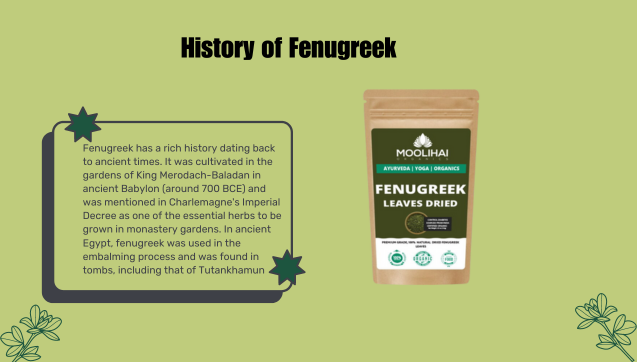Fenugreek Leaves (Trigonella Foenum-Graecum): Benefits, Uses
Welcome to Moolihai Malaysia.In this comprehensive guide to fenugreek leaves! If you’ve been curious about this powerful herb, you’re in the right place.
At Moolihai, we’re passionate about bringing you the finest natural products, including our premium dried fenugreek leaves, seeds, and powder. In this article, we’ll explore the incredible benefits of fenugreek leaves, their various uses, and answer common questions you might have.
Whether you’re a health enthusiast or simply looking to spice up your culinary repertoire, fenugreek leaves have something to offer everyone. So, let’s dive in and discover why this versatile herb deserves a place in your kitchen and wellness routine!
What are Fenugreek Leaves?

Fenugreek leaves, also known as methi leaves in Hindi, come from the fenugreek plant (Trigonella foenum-graecum). This herb belongs to the legume family and has been used for thousands of years in traditional medicine and cooking.
The fenugreek plant produces small, golden-brown seeds and green leaves, both of which are edible and packed with nutrients.
At Moolihai Malaysia, we offer high-quality dried fenugreek leaves, which retain much of their nutritional value and can be easily incorporated into various dishes. The leaves have a distinct, slightly bitter flavor with hints of sweetness, making them a popular ingredient in Indian, Middle Eastern, and North African cuisines.
History of Fenugreek:

Fenugreek has a rich history dating back to ancient times. It was cultivated in the gardens of King Merodach-Baladan in ancient Babylon (around 700 BCE) and was mentioned in Charlemagne’s Imperial Decree as one of the essential herbs to be grown in monastery gardens. In ancient Egypt, fenugreek was used in the embalming process and was found in tombs, including that of Tutankhamun.
In traditional medicine systems like Ayurveda and Traditional Chinese Medicine, fenugreek has been used for centuries to treat various ailments, from digestive issues to skin problems. Its cultural significance extends beyond medicine – in many Middle Eastern countries, fenugreek is considered a symbol of life and renewal.
Fenugreek Leaves- Nutritional Content
Before we delve into the benefits, let’s take a closer look at what makes fenugreek leaves so nutritious. These little powerhouses are low in calories but rich in essential nutrients. Here’s what you’ll find in about 100 grams of fresh fenugreek leaves:
– Calories: Approximately 49
– Protein: 4.4 grams
– Carbohydrates: 6 grams
– Dietary Fiber: 7.4 grams
– Fat: 0.9 grams
Fenugreek leaves are also an excellent source of vitamins and minerals, including:
– Vitamin K: Essential for blood clotting and bone health
– Vitamin C: A powerful antioxidant that supports immune function
– Vitamin A: Important for eye health and immune function
– Folate: Crucial for cell growth and DNA synthesis
– Iron: Necessary for oxygen transport in the blood
– Potassium: Helps regulate blood pressure and supports heart health
– Calcium: Essential for strong bones and teeth
– Magnesium: Important for muscle and nerve function
This impressive nutritional profile contributes to the many health benefits associated with fenugreek leaves. Let’s explore these benefits in more detail.
Health Benefits of Fenugreek Leaves

May Help in Blood Sugar Control
One of the most well-researched benefits of fenugreek leaves is their potential to help manage blood sugar levels. The high fiber content in fenugreek leaves can slow down the absorption of sugars in the digestive tract, which may help prevent spikes in blood glucose levels.
Additionally, fenugreek leaves contain compounds like 4-hydroxyisoleucine and galactomannan, which have been shown to increase insulin sensitivity and improve glucose metabolism. A study published in the International Journal for Vitamin and Nutrition Research found that consuming fenugreek leaves with a meal significantly reduced post-meal blood sugar levels in people with type 2 diabetes.
For those at risk of developing diabetes or those already managing the condition, incorporating fenugreek leaves into your diet could be a beneficial natural strategy. However, it’s crucial to work with your healthcare provider to monitor your blood sugar levels and adjust any medications as needed.
May Improve Digestive Health
Fenugreek leaves are rich in dietary fiber, which is essential for maintaining a healthy digestive system. Regular consumption of fenugreek leaves can help prevent constipation, reduce the risk of hemorrhoids, and promote overall gut health.
The soluble fiber in fenugreek leaves acts as a prebiotic, feeding the beneficial bacteria in your gut and supporting a healthy microbiome. This can lead to improved digestion, reduced inflammation in the gut, and potentially even enhanced immune function, as a significant portion of our immune system resides in our gut.
Furthermore, fenugreek leaves have been traditionally used to soothe digestive discomfort and reduce symptoms of indigestion. Their mucilaginous properties can help coat and protect the lining of the stomach and intestines, potentially reducing irritation and inflammation.
May Improve Heart Health
The high potassium content in fenugreek leaves may contribute to better heart health by helping to regulate blood pressure. Potassium is a crucial mineral that helps counteract the effects of sodium in the body, promoting healthy blood pressure levels.
Additionally, some studies suggest that fenugreek can help lower cholesterol levels, particularly LDL (bad) cholesterol. A study published in the Journal of Medicinal Food found that consuming fenugreek seeds for 20 days led to significant reductions in total cholesterol, LDL cholesterol, and triglycerides.
While this study focused on fenugreek seeds, the leaves also contain many of the same beneficial compounds. The fiber in fenugreek leaves may also contribute to cholesterol reduction by binding to cholesterol in the digestive tract and preventing its absorption.
By incorporating fenugreek leaves into your diet, you may be taking a step towards better cardiovascular health. However, it’s important to remember that heart health is influenced by many factors, including overall diet, exercise, and lifestyle habits.
May Improve Breast Milk Production / Lactation
For new mothers, fenugreek leaves have long been used as a galactagogue – a substance that promotes milk production. While more research is needed, some studies have shown promising results regarding fenugreek’s ability to increase breast milk production in nursing mothers.
A study published in the Journal of Alternative and Complementary Medicine found that mothers who drank fenugreek tea experienced a significant increase in milk production compared to those who didn’t. Another study in the journal Breastfeeding Medicine reported that fenugreek supplementation led to a doubling of milk volume in some cases.
The exact mechanism by which fenugreek increases milk production isn’t fully understood, but it may be related to its phytoestrogen content. These plant compounds can mimic the effects of estrogen in the body, potentially stimulating milk production.
If you’re breastfeeding and considering using fenugreek to boost milk production, it’s always best to consult with your healthcare provider or a lactation consultant before adding any new supplements to your diet. They can help you determine the right approach for your individual needs and monitor for any potential side effects.
May Offer Anti-inflammatory Properties
Fenugreek leaves contain antioxidants and compounds with anti-inflammatory properties. These include flavonoids like quercetin and luteolin, as well as saponins and alkaloids. These compounds may help reduce inflammation in the body, which is associated with various chronic diseases.
Chronic inflammation is linked to a range of health issues, including heart disease, diabetes, and certain types of cancer. By incorporating anti-inflammatory foods like fenugreek leaves into your diet, you may be able to help combat this underlying factor in many chronic diseases.
A study published in the International Journal of Molecular Sciences found that fenugreek extract exhibited significant anti-inflammatory effects in laboratory studies. While more research is needed to fully understand the anti-inflammatory potential of fenugreek leaves in humans, these initial findings are promising.
May Provide Better Skin Health
The vitamins and minerals in fenugreek leaves, particularly vitamin C and antioxidants, can contribute to healthy, glowing skin. Vitamin C is crucial for collagen production, which helps maintain skin elasticity and reduce the appearance of fine lines and wrinkles.
The antioxidants in fenugreek leaves help protect your skin from damage caused by free radicals, which can lead to premature aging. Some people even use fenugreek topically, creating pastes or masks to apply directly to the skin. While scientific evidence for topical use is limited, anecdotal reports suggest it may help with issues like acne and skin inflammation.
Furthermore, the anti-inflammatory properties of fenugreek may help soothe skin conditions like eczema or psoriasis. However, if you’re considering using fenugreek for skin conditions, it’s always best to consult with a dermatologist first.
May Offer Weight Loss Help
If you’re looking to manage your weight, fenugreek leaves could be a helpful addition to your diet. The high fiber content helps you feel fuller for longer, potentially reducing overall calorie intake. This can be particularly beneficial if you’re trying to lose weight or maintain a healthy weight.
Additionally, some studies suggest that fenugreek may help boost metabolism, though more research is needed in this area. A study published in the journal Phytotherapy Research found that fenugreek extract increased fat burning and reduced fat accumulation in laboratory studies.
It’s important to note that while fenugreek leaves can be a helpful tool in weight management, they’re not a magic solution. Effective weight management always involves a balanced diet, regular physical activity, and overall healthy lifestyle habits.
How to Use Fenugreek Leaves
Now that we’ve covered the impressive benefits of fenugreek leaves, you might be wondering how to incorporate them into your diet. Here are some delicious and easy ways to use our Moolihai dried fenugreek leaves:
In Curries and Stews:
Add a handful of dried fenugreek leaves to your favorite curry or stew for an extra layer of flavor and nutrition. They pair particularly well with lentil-based dishes and vegetable curries.
As a Seasoning:
Crush dried fenugreek leaves and use them as a seasoning for roasted vegetables, meats, or fish. They add a unique, slightly bitter flavor that complements many dishes.
In Bread and Flatbreads:
Mix dried fenugreek leaves into your dough when making bread or flatbreads for a nutritious boost. They’re particularly delicious in Indian-style flatbreads like methi paratha.
In Soups:
Sprinkle some dried fenugreek leaves into your soups for added flavor and health benefits. They work well in both vegetable and meat-based soups.
As a Tea:
Steep dried fenugreek leaves in hot water to make a soothing and healthful tea. You can enjoy it plain or add a slice of lemon and a touch of honey for extra flavor.
In Salads:
Rehydrate dried fenugreek leaves and add them to your salads for a unique flavor and nutritional punch. They pair well with other leafy greens and can add an interesting twist to your usual salad routine.
Dips and Spreads:
Blend rehydrated fenugreek leaves into dips like hummus or blend them with yogurt to create a flavorful spread for sandwiches or wraps.
As a Garnish:
Use finely crushed dried fenugreek leaves as a garnish for finished dishes. They can add a pop of color and flavor to everything from soups to rice dishes.
In Smoothies:
Add a small amount of dried fenugreek leaves to your morning smoothie for an extra nutritional boost. Start with a small amount and adjust to taste.
In Egg Dishes:
Sprinkle some dried fenugreek leaves into your scrambled eggs or omelets for a flavorful breakfast option.
Remember, a little goes a long way with fenugreek leaves. Start with small amounts and adjust to your taste preferences. The dried leaves are more concentrated in flavor than fresh ones, so you’ll need less when using dried fenugreek.
Frequently Asked Questions
Can I eat methi leaves every day?
Yes, you can eat methi (fenugreek) leaves every day in moderate amounts as part of a balanced diet. They’re nutritious and can contribute to overall health. However, it’s always best to vary your diet and include a wide range of vegetables and herbs for optimal nutrition.
What is the best way to eat fenugreek leaves?
There are many ways to enjoy fenugreek leaves. You can add them to curries, stews, soups, or salads. They can also be used to make tea or as a seasoning for various dishes. Some people enjoy them in flatbreads or as part of a vegetable stir-fry.
Experiment to find your favorite way of incorporating them into your meals. At Moolihai Malaysia, our dried fenugreek leaves are versatile and can be used in many of these applications.
What are the side effects of methi leaves?
While methi leaves are generally safe, some people may experience mild digestive discomfort, such as bloating or diarrhea, especially when first introducing them to their diet. In rare cases, allergic reactions may occur.
Methi leaves can also interact with certain medications and may affect blood sugar levels. It’s always best to start with small amounts and consult a healthcare provider if you have any concerns, especially if you’re pregnant, breastfeeding, or have a pre-existing health condition.
What is fenugreek leaf good for?
Fenugreek leaves are good for various aspects of health. They may help with blood sugar control, digestive health, and heart health. They’re also known for potentially supporting breastfeeding mothers by increasing milk production.
Fenugreek leaves have anti-inflammatory properties and may contribute to better skin health and weight management. They’re also a good source of vitamins and minerals, including iron, potassium, and calcium.
How do I store dried fenugreek leaves?
To maintain the quality of your Moolihai dried fenugreek leaves, store them in an airtight container in a cool, dry place away from direct sunlight. Properly stored, they can maintain their flavor and nutritional value for several months.
Can fenugreek leaves help with hair growth?
While more research is needed, some people use fenugreek for hair health. The leaves are rich in proteins and nicotinic acid, which are believed to be beneficial for hair growth and strength. Some traditional remedies involve applying a paste of fenugreek leaves to the scalp, but scientific evidence for this use is limited.







Add comment